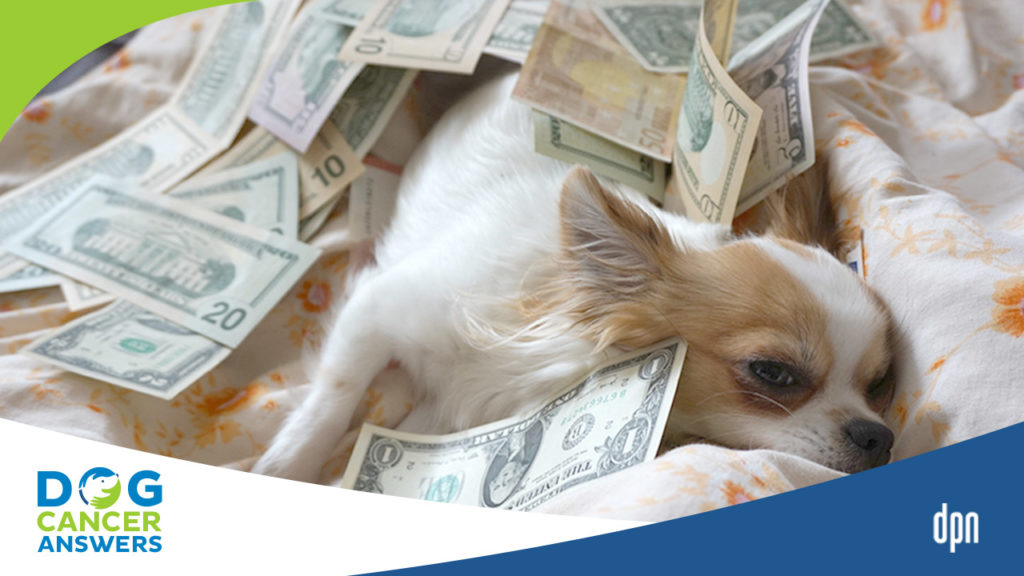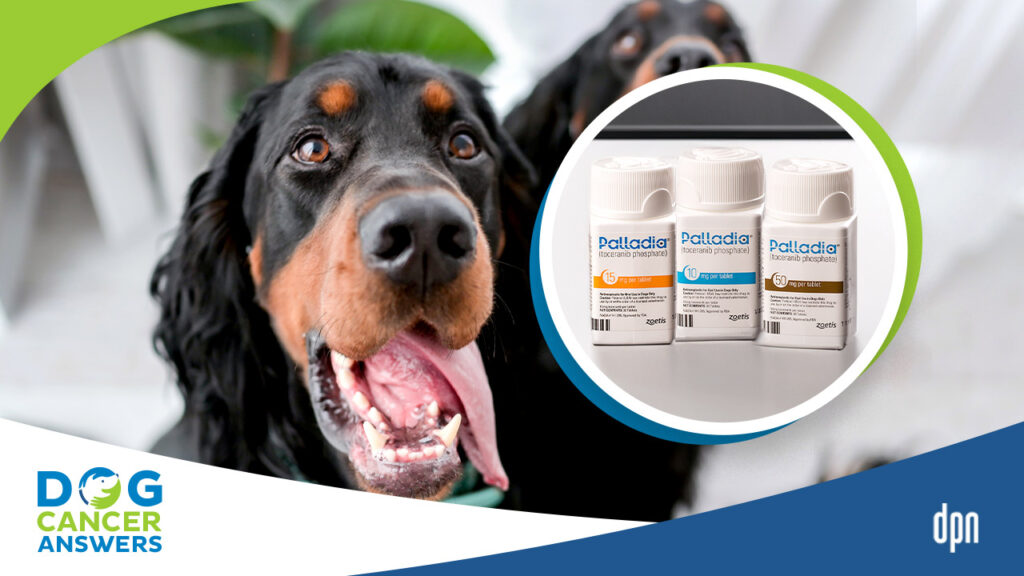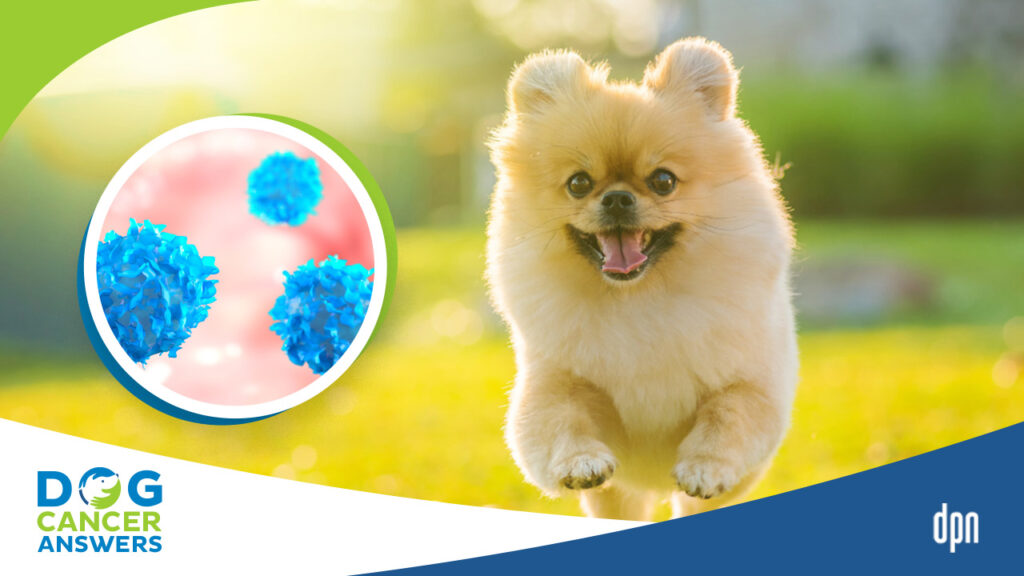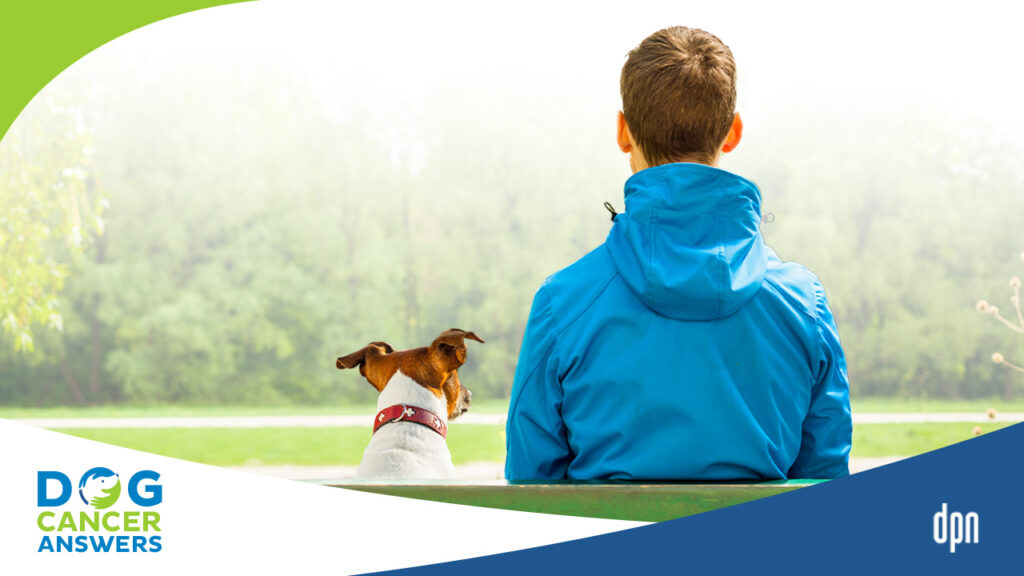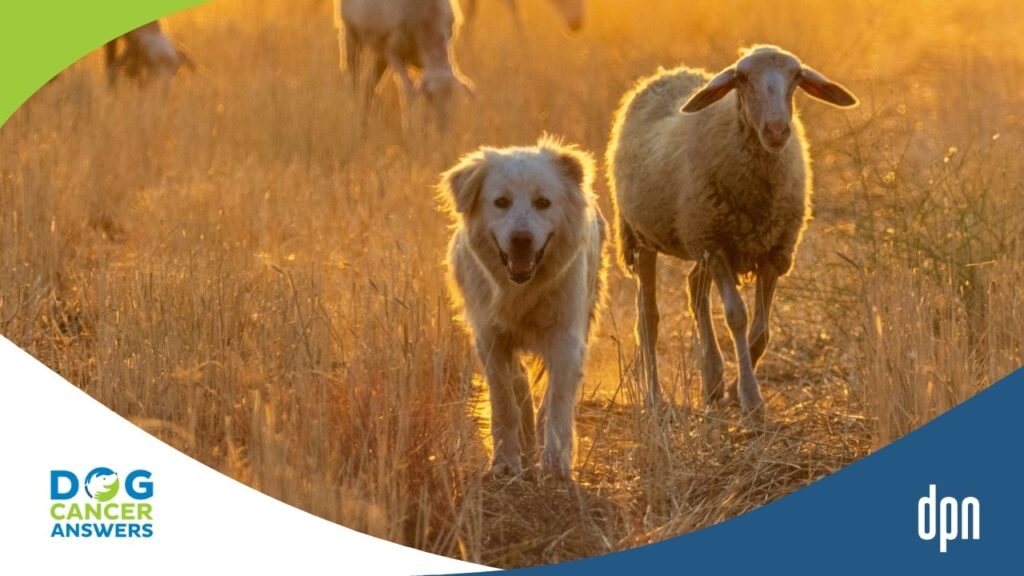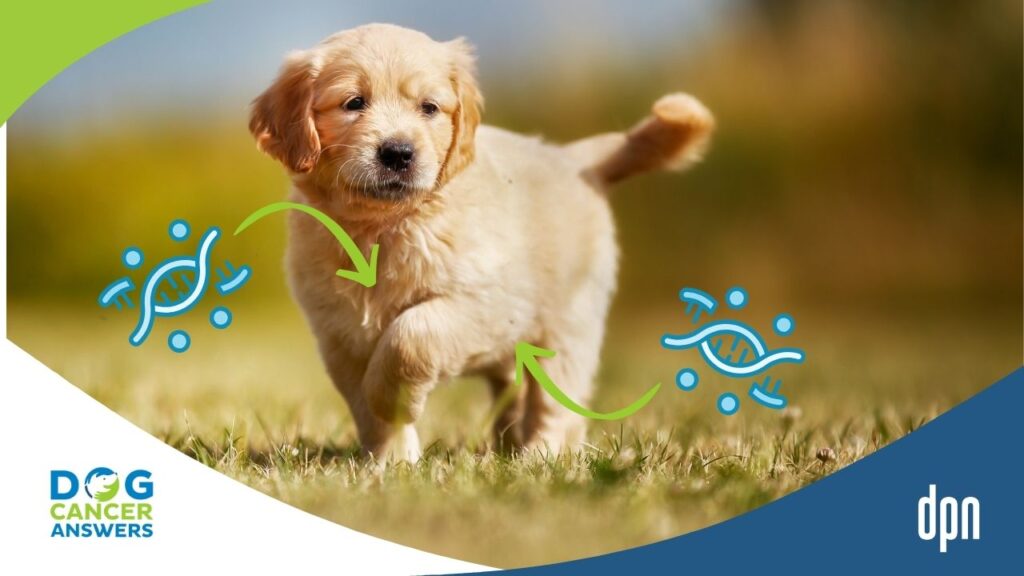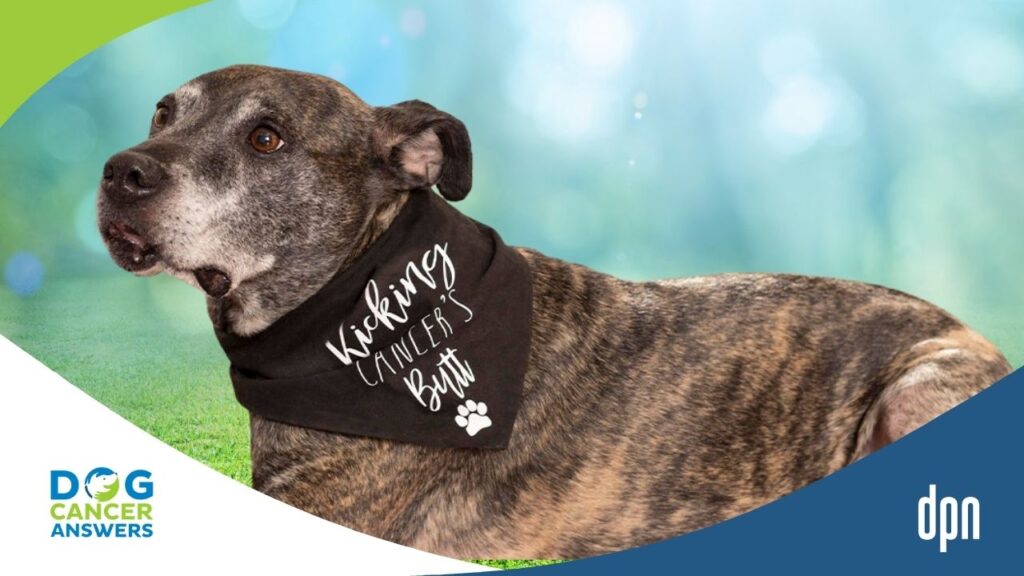[00:00:00] >> Dr. Megan Duffy: Sometimes we just need to go home and absorb the information and think about things. But if you’re coming out of that consultation saying I’m very comfortable, I’m ready to rock and roll. Let’s start treatment. It can absolutely happen same day.
[00:00:14] >> Announcer: Welcome to Dog Cancer Answers where we help you help your dog with cancer.
[00:00:22] >> Molly Jacobson: Hello listener. I’m, Molly Jacobson at DogCancer.com. And today we are talking about how to maximize your investment when you go to the veterinary oncologist. Whether you’re going just one time to see what your options are or whether you’re going one time and then continuing and pursuing treatment, you want to make sure that that first hour you spend with the specialist is maximized because it is more expensive than a general practice veterinary visit.
[00:00:52] It’s also longer. It’s also more comprehensive. So today, James Jacobson is talking to Dr. Megan Duffy. She’s a veterinary oncologist and she has lots of great advice about how to prepare and get the most out of that first veterinary visit with your veterinary oncologist. So without further ado, let’s go right to the interview with James Jacobson and Dr. Megan Duffy.
[00:01:18] >> James Jacobson: Hello, Dr. Duffy.
[00:01:19] >> Dr. Megan Duffy: Hi, thanks for having me.
[00:01:21] >> James Jacobson: Thank you so much for being on our show. Now, you earned your DVM from Michigan State and you’re, and you studied oncology at Washington State University, right?
[00:01:32] >> Dr. Megan Duffy: Yep. That’s where I did my residency.
[00:01:34] >> James Jacobson: Residency. Okay. And you are a full ACVIM accredited diplomat of the, uh, veterinary oncology group here in the US.
[00:01:43] >> Dr. Megan Duffy: All the fancy letters.
[00:01:44] >> James Jacobson: All the fancy letters. If you want to make the most of the investment and most importantly of the time that you spent to get all those fancy letters and your time, very limited time, with the dog, what do you recommend that people do ahead of time to prepare?
[00:02:05] >> Dr. Megan Duffy: I think this is such a good question. It has a few different components to it. Uh, first and foremost, we will be, or your oncologist will be, calling basically every veterinarian your pet has seen in the last few years to try to get any records, test results, imaging, et cetera, so that when you come to that appointment, I have already reviewed your pet’s records that I’ve looked at all of those things gone through and, and already kind of, you know, made some determinations about where are we at?
[00:02:38] What’s been done so far? What do we know? Uh, so we’ve, we’ve done some legwork beforehand, but by that same token, it is never wrong to bring a copy of records just in case, or a CD of imaging, because we know that things happen, or just to say, hey, here are my records. What do you have? Do I have that whole picture?
[00:02:59] And what else I think is, is really nice and really, really cool is, you know, have you done some Googling or research? Obviously Google isn’t the end point, but it’s a starting point. Um, you know, what kind of baseline information do you have or thoughts? Um, things that you’ve looked at. And what I think is really nice is when people do come with a list of questions or things that they’ve heard about, uh, maybe they’ve listened to a podcast about a certain treatment or something like that to say, Hey, is this a fit for my, my dog?
[00:03:29] Is this going to be a good choice? Um, really so that we have a good idea of, well, you know, gosh, what are your goals? What are your expectations so that I can meet them? And I will actually ask, what are your expectations for this visit? What do you really want to get out of this conversation so that we make sure that we end our first consultation, knowing that your needs have been met essentially.
[00:03:52] >> James Jacobson: So what should someone expect from their first visit for one of these initial consultations to be like with an oncologist?
[00:03:59] >> Dr. Megan Duffy: I would say the biggest thing is expect this to take time. This is not a general wellness, simple, straightforward visit. This is, my pet has just received a life changing diagnosis and I would say expect this to take at least an hour. It is a lot of talking and we really want to unpack what is this diagnosis? What does it mean in general? What does it mean for your pet? What are our treatment options? What do those look like in terms of quality of life, time, financial, emotional and timing investments?
[00:04:36] What’s going to be the right fit and then decide, do we need to do any additional testing? Do we need to do anything else to decide if this treatment is appropriate? And then oftentimes then the next step is doing some more diagnostics or starting treatment, things like that. So I would say expect a minimum of one hour of talking in the room before anything else happens.
[00:04:58] >> James Jacobson: So oncologists are recognizing that you’re going to have a lot of questions and they’ve allocated the time. This isn’t a short 20 minute visit.
[00:05:05] >> Dr. Megan Duffy: Oh, absolutely. This is really your time to ask all of those questions and get a really clear understanding of what’s going on.
[00:05:13] >> James Jacobson: Now speak to bringing the imaging. So if your general practice vet has a, you know, sonogram or an ultrasound or something like that, or x-rays, you should bring a copy of, of all of that.
[00:05:28] >> Dr. Megan Duffy: It’s definitely beneficial. Um, usually what we like to do is get that imaging in advance, especially assuming that most of it’s going to be digital. We can upload it to our server, we can integrate it with whatever additional imaging is taken throughout the pet’s lifetime. And then we have that basis of comparison.
[00:05:46] Um, and that can be really, really helpful sometimes though. Maybe the pet went for x-rays the day before their consultation with their specialist. And perhaps they didn’t get uploaded yet, so maybe it’s a safe thing to even, you know, bring them on a disk just in case and say, Hey, do you have my most recent images?
[00:06:03] We just updated these the other day. And that can be just a nice way of not having this awkward 20 minute delay while we’re calling for additional records in the middle of your consult.
[00:06:13] >> James Jacobson: And now, I mean, in this day and age, we should know this, but it’s a good reminder. We own our medical records regardless. So if you got your vet to do it and you decided you want a second opinion or a third opinion, go somewhere else, all that data, those files, those images are your property.
[00:06:31] >> Dr. Megan Duffy: Yes, and at any point in time, for any reason, you can request an entire copy of your pet’s medical records, imaging, et cetera, and that will be provided to you.
[00:06:40] >> James Jacobson: Okay, so when you talk about, like, all the vets your dog has seen, how far back would you go?
[00:06:45] >> Dr. Megan Duffy: I would say at least, in oncology, most things have not been going on for years and years, usually as a, as a little bit of overlap, we tend to request at least the last two years of the pets medical records. Sometimes it means we get their entire life of medical records. It’s just sometimes easier to, to click a button and send it that way. And that’s just fine. More information is never a bad thing. But typically we request the last two years.
[00:07:11] >> James Jacobson: The fact that, like, you or your staff are calling around to every vet that your dog has seen, I guess that speaks to the relative, uh, state of electronic medical records. How bad is it? I mean, I’ve worked with some veterinarians who, and some physicians, who are like, they don’t know what a computer is. They’re basically, they’re just dealing with paper. And then of course, some people are in there with their iPads and their little, uh, Apple Pencils and, and doing all sorts of stuff.
[00:07:41] What is the state or at least what is the, your experience with medical records and how easy it is to obtain that information?
[00:07:48] >> Dr. Megan Duffy: That’s definitely hit or miss. There are some clinics out there that are entirely paperless. They’re fully electronic. Everything is integrated in. It’s very plug and play. And there are others where we’ve got 20 handwritten pages that we are scanning in one by one. And we’re doing a little bit of guesswork for what each individual word might actually be. Um, But that’s okay. That’s, that’s part of the fun in trying to figure things out.
[00:08:13] >> James Jacobson: That’s where the fax machine and the scanners are going in and the, and the deciphering of their handwriting. Do you find that the medical records are a little bit better kept or at least more electronic when it’s from a big practice or a small practice or does that not have a bearing?
[00:08:28] >> Dr. Megan Duffy: I think we see a little bit of everything. I’d say there’s definitely been more of a trend toward electronic medical record keeping. And it can be a big switch at first for an individual clinic or hospital, but then it becomes so easy once it’s already laid out. And then you can type a couple of things or update a physical exam.
[00:08:45] And then I find that they have been more complete than maybe in the past where you see a scribble of healthy pet. And that was your only note that day. So it’s definitely gotten more detailed and more complex and integrated in lab work a lot easier that way. I think as well.
[00:09:01] >> James Jacobson: And then in terms of the type of vets, because obviously some of our listeners use, you know, holistic vets and some of our, you know, some of our listeners use general practice vets, there are all types of different vets. Do you want the records and information from all the different veterinarians who may make up the vet team?
[00:09:18] >> Dr. Megan Duffy: Absolutely. Uh, this is interesting. I saw a patient yesterday who had seen their general practitioner, another oncologist, and a holistic vet before they came to see me for a second opinion or fourth opinion or whatever that ends up being. Um, but it. It was very useful to have an idea of what’s been going on. How has this all transpired? What have the recommendations or conversations been up to this point so that I’m not jumping in blindly saying, have you talked about this? Have you discussed X, Y, and Z? Where are we at? But it’s a little bit better laid out.
[00:09:52] >> James Jacobson: And then in terms of Dr. Google, and it’s nice when a, when a veterinarian not only recognizes it, but sees its benefit, coming in prepared by having obviously listened to all the relevant episodes of Dog Cancer Answers and looked at our blog and, and all that, but, you know, Googling and getting all sorts of information, how much is too much?
[00:10:14] ‘Cause this is, can be a little overwhelming. And how much is probably not enough that you really could do a little bit more to prepare yourself with the questions so that you can make the best time with your oncologist?
[00:10:27] >> Dr. Megan Duffy: I think a little bit of Googling. is very reasonable, especially a truly veterinary website. Um, VIN or Veterinary Information Network does a lovely vet partner, which is really geared toward pet owners, um, or things like that. I don’t expect anybody to have read, um, all of the relevant literature in PubMed about a given tumor type that is way overkill, and it’s easy to take that out of context.
[00:10:53] But it is nice to have some sort of an idea of what this might mean or some options. I think it’s very easy to go down this rabbit hole of individual experiences that are necessarily the worst thing in the world, but you know, there’s a lot of only very good or very terrible things on the internet. And I think that’s where this is a great starting point. Background information is awesome. We just can’t go too far without kind of reeling it in and making sure that we’re still on track in terms of what is going to be relevant to your pet.
[00:11:26] >> James Jacobson: Okay. And so come on with a list. Uh, you think paper and pencil is good? Do you want people to record it? Or what, what are your thoughts in terms of how to really memorialize and be able to understand what’s going on in that consultation?
[00:11:40] >> Dr. Megan Duffy: Um, I, I have a lot of families who do come in with a paper and pencil list of questions and sometimes, especially if there are family members who can’t be present and they have specific questions, that’s a great way to get them out. Um, I have been recorded both voice and video and all of those things or had somebody who was not available to come in person beyond speakerphone and that’s absolutely fine.
[00:12:04] It’s whatever media you need to get your questions answered. And of course the follow up is. Everything we are going to talk about is going to be typed up and summarized for you, emailed to you, and emailed to your primary care vet, just so we have that good continuity of care and we’re all on the same page.
[00:12:21] Some people are very active listeners. They want to write things down. They want to take notes, even if this will be provided later. Love that. And some people say, great, I’m going to throw away my pen and paper and just listen and soak it in. So no wrong answer as far as that goes.
[00:12:37] >> Molly Jacobson: Let’s pause this great conversation here for a quick word from our sponsors and then we’ll be right back with Dr. Megan Duffy.
[00:12:49] And we’re back with James Jacobson and Megan Duffy.
[00:12:53] >> James Jacobson: Anything that you might suggest people not bring to the initial visit?
[00:12:58] >> Dr. Megan Duffy: Please don’t bring all of your neighbors and cousins and extended family and all of their children and have 10 people in a room asking a lot of questions because that can be really distracting and overwhelming and sometimes it can make things a little bit tougher. I don’t mind, you know, if you got to bring your kids, that’s absolutely fine. As long as they’re, you know, entertained and able to do their own things so that we don’t get too far off track.
[00:13:26] Other pets sometimes are okay, as long as they’re reasonably well behaved. I don’t mind that at all. So the, the other attendees to the appointment, that’s, that’s pretty simple and pretty easy.
[00:13:37] >> James Jacobson: Now, this may sound like a stupid question. Do you have to bring your dog?
[00:13:42] >> Dr. Megan Duffy: Yes. That is actually not a stupid question because every so often families come and say, I’m ready for my consultation. You’ve got all of Sparky’s records. Let’s roll. And for, for pretty specific legal reasons, I can’t make specific recommendations for your pet without doing an exam and establishing a relationship.
[00:14:03] And it may seem silly, you know, You’ve got all of my dog’s records. Don’t you know what, what you’re going to recommend? And in very vague terms for the disease, kind of, yeah, but I need to meet your dog and make sure that whatever we might be talking about is really going to be a good fit based on how they are on physical exam, if they still have a tumor in place or if it’s been removed and how is that scar healed or, you know, how is the dog’s overall health today?
[00:14:31] So there are so many things that go into it where, you know, gosh, we really can’t do a whole lot unless the dog is physically there at the appointment.
[00:14:39] >> James Jacobson: So what about the concept of like, are there any treatments? Are they going to be like, okay, like a normal, a general practice vet. You go in, you know, and then we’re going to start this thing or we’re going to do this test. Is that something that can be expected?
[00:14:54] >> Dr. Megan Duffy: Absolutely. And that is one thing where obviously this is a very emotionally charged visit. Sometimes we just need to go home and absorb the information and think about things. But. If you’re coming out of that consultation saying I’m very comfortable, I’m ready to rock and roll, let’s start treatment, it can absolutely happen same day.
[00:15:13] >> James Jacobson: So, in terms of surprises that you’ve encountered during some of these initial consults, do you have any that come to mind?
[00:15:23] >> Dr. Megan Duffy: Let’s see, surprises would be every so often we will get off track and perhaps families will bring a different pet and say, well, gosh, while you’re here, can you look at Fluffy? Can you do X, Y, or Z? That’s not always time that’s built in my day, or I’m maybe not the most appropriate person to be evaluating Fluffy’s orthopedic condition as an oncologist. It’s just, it’s not the best place for you to spend your time and money.
[00:15:48] Um, probably some other things I think surprises that are not as silly, but are tough are when families have completely unrealistic expectations, and that can be for a variety of, of reasons. But maybe say, well, I read on the internet that dogs with this condition can live for 10 or 12 years. And I’ll say, well, gosh, you know, unfortunately, our typical outcome is more like 10 or 12 months and something like that, where I’ve completely dashed their hopes just from a misunderstanding. And that is a little bit tough to recover from.
[00:16:24] Or families who are completely blindsided by a prognosis, which I think that’s where maybe a conversation with your vet or even a touch of Googling on the side can help a little bit.
[00:16:34] >> James Jacobson: So you should come in prepared and kind of understand the, what the expectations and the prognosis is so that you’re not flabbergasted when the vet tells you that it is.
[00:16:44] >> Dr. Megan Duffy: It is really nice to have some understanding of, is my dog’s prognosis days? Is it weeks? Is it months? Could this be years? Even in really broad brush strokes so that you don’t come in saying, my dog’s going to have her normal lifespan and for somebody else to say, gosh, that’s really not the case.
[00:17:02] >> James Jacobson: Can you cover something that we’ve talked about in this show before, but I don’t think we can talk about it too much, which is please define median life expectancy.
[00:17:12] >> Dr. Megan Duffy: Absolutely. And, um, what we usually speak in median life expectancy or median survival time, and the best way to think about that is that everybody’s outcome for a given disease and a given treatment exists on this bell curve and the very middle of the bell curve, that’s the median. So it means that at this point in time, 50 percent of the patients that we’ve treated are still with us and 50 percent have passed away.
[00:17:38] And so It’s a reasonable expectation if you are that average typical pet, and we don’t use averages because they’re very easily skewed, um, by someone who does really well or really poorly. So it’s typically medians. Um, and medians are a good starting point. They’re a good idea of perhaps what’s typical if there can be two typical in oncology. It also means that for every pet who does phenomenally better, somebody doesn’t do as well. And there still is that little bit of a range of outcomes.
[00:18:09] >> James Jacobson: Because those outliers can really skew things. And If you’re an optimist or a pessimist, you may stick to hearing those numbers and not understand the math term median.
[00:18:21] >> Dr. Megan Duffy: Absolutely.
[00:18:22] >> James Jacobson: Which I think is so, so common. Let’s talk a little bit about the price tag for this initial consultation. Now, obviously you are in Minnesota, and I’m sure it’s more expensive in New York or Los Angeles, but what can someone expect in terms of a range for initial concology consultation?
[00:18:41] >> Dr. Megan Duffy: I would say for an oncology consultation, again, taking in some, some regional changes in every hospital is different. I would say you are probably going to spend, um, 200 to $250 for that first consult. And that’s a lot of sticker shock. If, if maybe you, you hop over to your local vets and maybe spend 40 or 50 on an exam fee and that’s your normal.
[00:19:07] So much of that comes in with the background, the time it takes for us to comb through your dog’s entire medical record, the time we’re going to spend with you in the room and really give you as much information so that you can make good decisions as possible. So this is not supposed to be a $200 consult that lasts five minutes. This is supposed to be a pretty long process so that it’s not just cost, but also just the value that you get from that visit.
[00:19:35] >> James Jacobson: Dr. Megan Duffy. Thank you so much. If, uh, you have any final thoughts, I’d love you to share those with us. Any final thoughts on what to do to prepare for your visit?
[00:19:45] >> Dr. Megan Duffy: I’d say, come on in with an open mind, have your questions ready, and we’ll go through everything and make sure that wherever we go from here, everybody’s really comfortable.
[00:19:55] >> James Jacobson: Dr. Megan Duffy, thank you so much for being with us today.
[00:19:58] >> Dr. Megan Duffy: Thank you.
[00:20:00] >> Molly Jacobson: And thank you, listener, for joining us today. I hope this helps you plan for and maximize your investment in your veterinary oncology visits. I know that that is an important part of dog cancer, knowing that you are making good decisions with confidence.
[00:20:19] I hope you’ll join us on DogCancer.com and join our Facebook support group at DogCancer.com/support. And I hope that you will follow us on any podcast platforms you subscribe to, so you never miss a future episode. From all of us here at Dog Podcast Network, I’m Molly Jacobson, wishing you and your dog a very warm, Aloha.
[00:20:47] >> Announcer: Thank you for listening to Dog Cancer Answers. If you’d like to connect, please visit our website. at DogCancer.com or call our listener line at (808) 868-3200. And here’s a friendly reminder that you probably already know, this podcast is provided for informational and educational purposes only. It’s not meant to take the place of the advice you receive from your dog’s veterinarian.
[00:21:10] Only veterinarians who examine your dog can give you veterinary advice or diagnose your dog’s medical condition. Your reliance on the information you hear on this podcast is solely at your own risk. If your dog has a specific health problem, contact your veterinarian. Also, please keep in mind that veterinary information can change rapidly, therefore, some information may be out of date.
[00:21:30] Dog Cancer Answers is a presentation of Maui Media in association with Dog Podcast Network.


